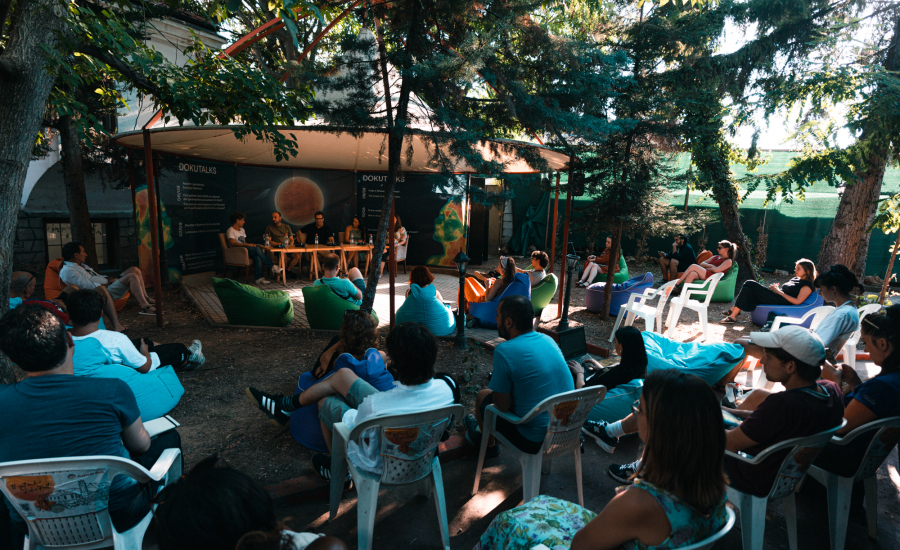06/08/2022
Discussions and encouraging debate about topics that concern society, but also filmmakers in particular, are an organic part of DokuFest. Through DokuTalks, these topics come to the audience from panelists, professionals from various fields. They share with each other stories that have happened to them and opinions, in order to raise awareness and increase attention.
This Saturday afternoon, the second DokuTalks discussion was held in the backyard of "Shani Efendi". The panel consisted of 4 documentary film professionals, Samir Karahoda, Dea Gjinovci, Marija Zidar, Ljubomir Stefanov. The panel, moderated by Aliriza Arënliu, shared experiences from a personal perspective and not only.
What is the fate of documentary film characters after the film ends?
"I'm taking inspiration from my experience in the movie "Honeyland" to express what happens in the public-protagonist relationship and the pressure that the former has on the protagonist of a film. I have tried to be objective about this matter and not be influenced, although it is quite difficult. In my opinion, although I don't think this is just my opinion, but for the links of making a film, before and after, no one asks about the antagonists. No one asks about antagonists who are also human. It is a question that will probably never be answered", said director Ljubomir Stefanov.
While a similar attitude was brought to attention by the producer of the film "Wake up on Mars", Dea Gjinovci, who focused on the involvement of the team of filmmakers in the event that a film deals with and in their relationship with the characters of the film.
"During the shooting of the movie "Wake up on Mars" it was impossible not to connect emotionally with the family and the protagonist children. I never put barriers between myself and them, so I think it is really necessary that we help these characters who become part of our cinematic products. Same as I have tried to do in my case. In a way I became part of their family and they became part of my life. Of course, there were times when I said I shouldn't get involved, but that turned out to be extremely difficult. The conversations held with them when you are there are more informal and of course this makes you experience some things more and more closely. At the end of the day, their presentation on film will be timeless and we would have to overcome human nature not to get emotionally involved."
While the director Marija Zidar, who focused on her experience in the film "Reconciliation" in her speech, presented another side of the discussion, paralleling it with a journalistic point of view.
"I have a journalistic past and the first question they ask you in journalism is what happens when you point the microphone at someone. Because in special situations protagonists have the tendency to speak without knowing that they are becoming protagonists. The same thing happens in the movie. You are not always the only one who decides about the film, where it will be shown, who will be the audience that will follow it."
Then the well-known director Samir Karahoda shared a story of his film "In Between, Displaced", competing in the 2021 Cannes Film Festival.
"I started my creativity shooting around Prizren related to really specific traditions. I started by asking people if I could shoot and they opened doors for me. This is what I like in such contexts, that people have the nature of opening their doors to you even without knowing who you are. When it became possible for me to make a film, I took my laptop and made a contract with the characters. In the contract I clearly stipulated the point that the film in which they would be the protagonists would never be used for commercial purposes. I can never forget the scene when in a village of Prizren one of the protagonists offered me brandy while we were watching the finished film. After seeing it he told me if I could extend it a bit. He even offered to find the money himself, so that I could extend the film. The first problem I had with the characters was convincing them to play themselves since I didn't want to get actors. From the beginning I knew that we had to raise our voice and if we wanted our voice to reach the government and other structures, the film had to be shown abroad. Together with the two characters, we had the opportunity to go to Cannes and walk alongside each other on the red carpet. Currently, I am very happy that now they have the opportunity and can present themselves and their story. "
"Post Partum" was just one of the diverse topics that DokuTalks addressed, while in the following days a series of other debates will enrich the festival's activities.
by Ana Haxhimali
Photo Credits: Esad Duraki



